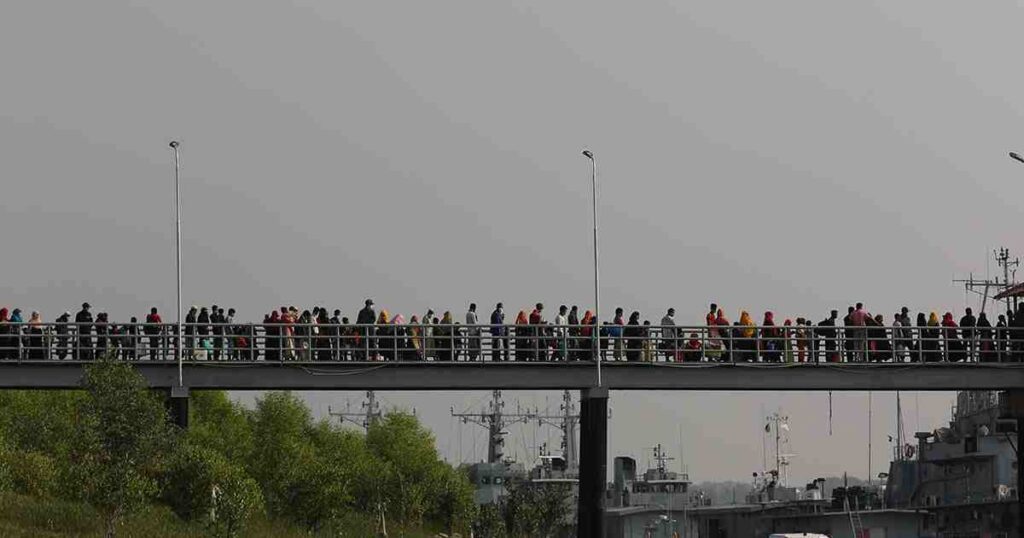Chittagong, Dec 04 – The first batch of 1,645 Rohingyas have reached Bhasan Char from Chittagong. They had earlier been brought from Ukhiya in Cox’s Bazar to Chittagong in buses.
Eight ships carrying the forcibly displaced Myanmar nationals left the port city on Friday morning.
The first batch of 1,642 Rohingyas from Ukhiya’s Balukhali camp in Cox’s Bazar has been shipped to Bhasan Char from Chattogram under the supervision of the Bangladesh Navy.
Eight ships carrying the forcibly displaced Myanmar nationals left the port at 9 am on Friday after an overnight stay at a temporary transit camp at the BAF Shaheen College.
Bangladesh is hosting more than 1.1 million Rohingyas most of whom came here from their homeland in Myanmar since Aug 2017. Bangladesh has been urging the global community to mount pressure on Myanmar for effective repatriation of the Rohingyas.
The government plans to shift some 100,000 Rohingyas to Bhasan Char in phases. Located 34 kilometres from the mainland, the island surfaced 20 years ago and was never inhabited.
Contractors say its infrastructure is like a modern township, with multi-family concrete homes, schools, playgrounds and roads. It also has solar-power facilities, a water supply system and cyclone shelters.
Foreign Minister AK Abdul Momen on Thursday said the Rohingyas are not being taken there forcibly.
Facilities for Rohingyas
The Ministry of Foreign Affairs said the government of Bangladesh has ensured adequate supply of food along with proper sanitation and medical facilities for Rohingyas in Bhashan Char.
Appropriate hospitals with highly-qualified health professionals, adequate Covid testing and treatment facilities are there in place, it said.
In addition to government agencies, around 22 NGOs are already there to extend all possible support to the relocated Rohingyas.
Adequate security has been ensured in the island by deploying police personnel, including policewomen, and the area is fully covered with CCTV cameras.
On the relocation, the government said its position was very clear and transparent from the very beginning that any relocation would be entirely on a voluntary basis.
Accordingly, a good number of Rohingya representatives undertook a “go-and-see” visit to Bhashan Char to see the facilities and make an independent and informed choice, MoFA said.
A number of NGOs and journalists also visited the island.
All of them expressed their high satisfaction at the available facilities in Bhashan Char, MoFA added.
A media team and a group of senior journalists are already in Bhashan Char.
More importantly, the relocation was preceded by adequate preparations and consultations held with different stakeholders, MoFA said.
“Several rounds of discussions, based on the queries of the United Nations, were also arranged and we hope that the international community and the United Nations, as per its mandate, will be involved in the process very soon,” the statement reads.
The relocation is part of the broader plan of repatriation which is the only priority for the Government of Bangladesh.
The MoFA said the skill development and livelihood opportunity that the Rohingyas would be able to avail in Bhashan Char would prepare them for their reintegration in the Myanmar society on return.
The types of economic activities such as fishing, agriculture, goat rearing, etc that they used to pursue in Rakhine state are available in Bhashan Char.
Repatriation attempter failed twice in November 2018 and August 2019 amid Rohingyas’ lack of trust in the Myanmar government.
Bangladesh and Myanmar signed the repatriation deal on November 23, 2017.
On January 16, 2018, Bangladesh and Myanmar signed a document on “Physical Arrangement”, which was supposed to facilitate the return of Rohingyas to their homeland.
Bangladesh thinks Rohingyas will “jeopardise regional and international security” if the 1.1 million Rohingya people are left unattended and not given the opportunity to return to their homeland.
He recently said Rohingyas will “jeopardise regional and international security” if they are left unattended and not given the opportunity to return to their homeland. – UNB




